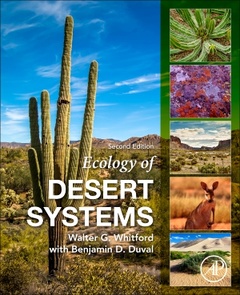Description
Ecology of Desert Systems (2nd Ed.)
Language: English
Subject for Ecology of Desert Systems:
473 p. · 19x23.3 cm · Paperback
Description
/li>Contents
/li>Readership
/li>Biography
/li>Comment
/li>
Nearly one-third of the land area on our planet is classified as arid or desert. Therefore, an understanding of the dynamics of such arid ecosystems is essential to managing those systems in a way that sustains human populations. This second edition of Ecology of Desert Systems provides a clear, extensive guide to the complex interactions involved in these areas.
This book details the relationships between abiotic and biotic environments of desert ecosystems, demonstrating to readers how these interactions drive ecological processes. These include plant growth and animal reproductive success, the spatial and temporal distribution of vegetation and animals, and the influence of invasive species and anthropogenic climate change specific to arid systems. Drawing on the extensive experience of its expert authors, Ecology of Desert Systems is an essential guide to arid ecosystems for students looking for an overview of the field, researchers keen to learn how their work fits in to the overall picture, and those involved with environmental management of desert areas.
1. Conceptual Framework, Paradigms, and Models 2. Landforms, Geomorphology, and Vegetation 3. Characterization of Desert Climates 4. Wind and Water Processes 5. Patch—Mosiac Dynamics 6. Adaptations 7. Primary Production 8. Consumers and Their Effects 9. Decomposition and Nutrient Cycling 10. Nonnative, Exotic, or Alien Species 11. Anthropogenic Climate Change in Deserts 12. Desertification 13. Rehabilitation of Degraded Landscapes 14. Monitoring and Assessment 15. The Human Footprint (Roads; Urbanization; Energy Developments)
Researchers (in both academia and industry) dealing with arid land environments and arid ecosystems around the world, upper undergrad and postgrad students, environmental planners and managers, climate change scientists
Benjamin D. Duval is Assistant Professor of biology at the New Mexico Institute of Mining and Technology. His research focuses on soil-atmosphere interactions in the context of arid land biogeochemical cycles, and arid land agro-ecology. He specifically investigates invasive plant influence on soil-microbial interactions in southwestern US riparian systems, water use impacts on greenhouse gas flux in arid agro-ecosystems, and the climate footprint of encroaching shrubs in the Chih
- Highlights the complexity of global desert systems in a clear, concise way
- Reviews the most current issues facing researchers in the field, including the spread of invasive species due to globalized trade, the impact of industrial mining, and climate change
- Updated and extended to include information on invasive species management, industrial mining impacts, and the current and future role of climate change in desert systems



